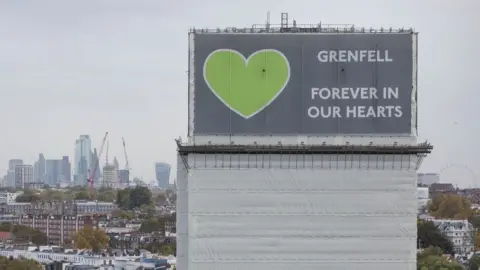Grenfell Tower inquiry: We had no escape route, say disabled residents
 Getty Images
Getty ImagesDisabled residents of Grenfell Tower have told a public inquiry that no-one discussed with them how to escape the 24-storey building in an emergency.
One woman said it took her 30 minutes to walk down from her 20th floor flat when lifts were not working.
Lawyers for residents and the bereaved have called the fire in June 2017 "a landmark act of discrimination" against disabled people.
It killed 72 people, including 41% of the tower's vulnerable adults.
As part of phase two of the inquiry, examining how the building was managed, disabled residents told how they had no escape routes in an emergency and how many of them struggled to access their own homes when lifts were broken.
On one occasion, Corinne Jones said she had to carry her son on her back, all the way down the stairs from her 17th floor flat.
Months earlier she had warned the council, the Royal Borough of Kensington and Chelsea, that her son had mobility issues due to an autoimmune condition - and they had assured her there would always be a working lift available.
But she said she did not complain to them or the Tenant Management Organisation which ran the building on the council's behalf, because they had never responded to previous complaints and she found them insensitive.
'Price tag on our lives'
Emma O'Connor ticked a box to say she had a disability when she moved into a 20th floor flat in Grenfell Tower in 2012, because she needed support to walk.
Staff from the Tenant Management Organisation did not discuss how she should evacuate the building in the event of a fire, she said.
She said it took her 30 minutes to walk down the stairs and when the lifts were broken she sometimes had to stay with family until they were repaired.
Ms O'Connor said the Tenant Management Organisation only gave them selective information about the refurbishment, were unresponsive to complaints and "rude" to residents.
At the end of her evidence, she said: "I don't think it's fair that these corporate companies were given the choice to choose what the price tag on our lives should be."
Mahboubeh Jamalvatan, who lived on the third floor, also said she had never been given any instruction on fire safety. On the night of the disaster, she had to slide, step-by-step, down the stairs on her bottom because she was unable to walk.
Maher Khoudair, who used crutches after contracting polio as a child, said there was no escape route with disabled access from the ninth floor flat where he lived with his wife and three daughters.
The only route he could take was the stairs, and no-one explained to him what to do in a fire when he moved in.
Hisam Choucair said his mother, Sirria, lived on the 22nd floor and used a walking stick due to a bad back.
A personal evacuation plan was never made for her, he said. She died in the fire.
'No point' asking for help
The inquiry also heard that as people living in the tower became more frustrated with the poor quality of the refurbishment, in which dangerously flammable cladding was installed, the Tenant Management Organisation decided to scrap regular residents' meetings.
In a witness statement, project manager Claire Williams said "meetings could become difficult with disruptive conduct from a small number of residents".
Nurse Betty Kasote said she felt she had been branded a "troublemaker" when she tried to get leaks in her flat fixed, but she said she did not recall anyone being disruptive.
Rosita Boniface, who lived on the 11th floor of the tower for 36 years, said she had never heard a fire drill there.
She said she had not asked the Tenant Management Organisation for an evacuation plan for her husband, who is blind "because I did not think they would care".
"It was always a struggle to get them to respond to my complaints, so I felt that there was no point going to them for help," she said.
